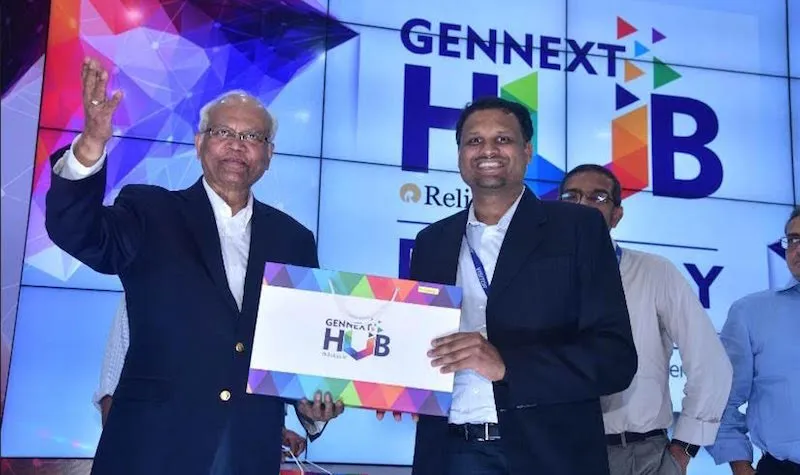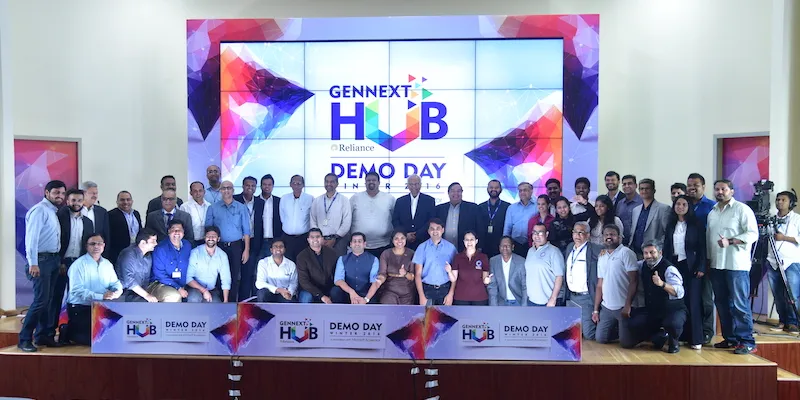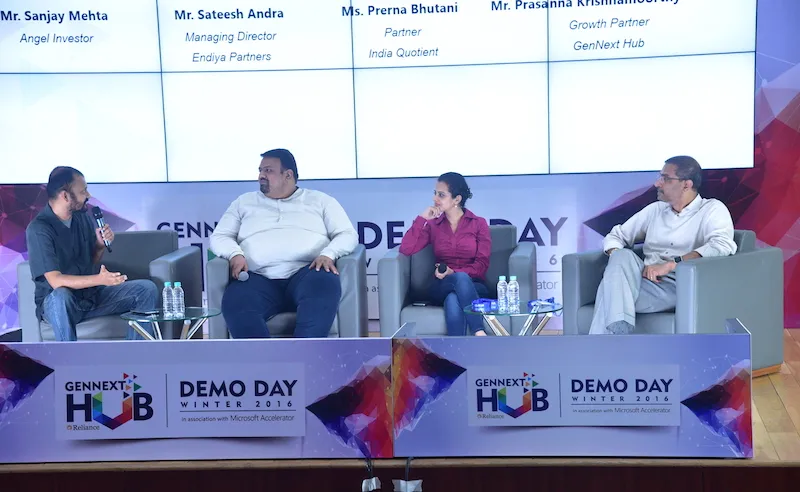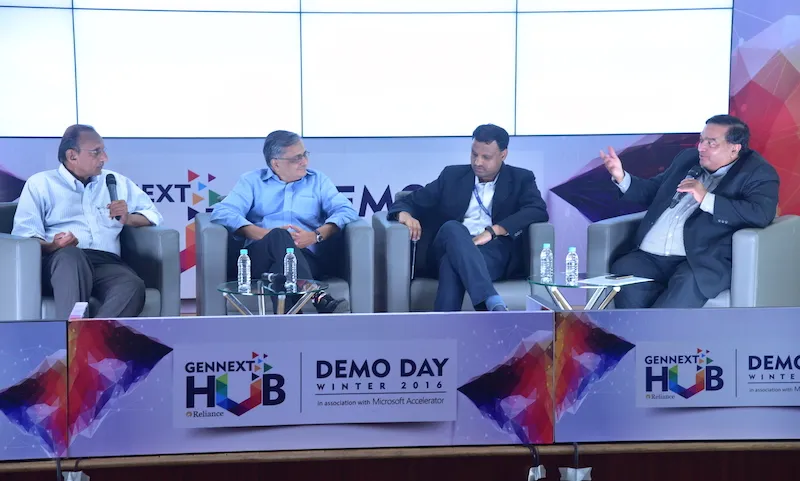
GenNext Hub
View Brand PublisherGenNext Hub startups are pole-vaulting to achieve exponential growth
“Startups should not leapfrog anymore; they should pole-vault and inherit the JioSpirit of fast and hyper growth.”
With these words, renowned scientist Dr. R. A. Mashelkar set the tone for the demo day of the fourth cohort of startups to graduate from Reliance Industries Limited’s (RIL) Scalerator programme. “Startups must pole-vault and not leapfrog. A frog can leap only so much. On the other hand, if you pole-vault, the size of the pole will determine how far you will go. Take a million-metre-long pole and you can cross continents. With this mindset, you can achieve exponential and non-linear growth,” he explained. He urged GenNext Hub startups to exhibit the “JioSpirit”, in a reference to the exponential growth demonstrated by Reliance Jio.

Ravi Gururaj, Founder of QikPod and Chair of Nasscom Product Council, who led a panel discussion on “Startup Playbook for Corporate India”, congratulated GenNext for continuously improving the quality of cohorts. According to him, entrepreneurs are getting more audacious with their goals and increasing their traction. Ravi opined that this is an awesome time to be an entrepreneur – with Jio presenting a huge consumer opportunity and a single organised distribution channel, unique identity infrastructure through Aadhaar, payments through UPI and software companies filling gaps in the platform stack, GTM stack. A whole set of infrastructure and tools are now available to entrepreneurs, that weren’t available three years ago.
Ravi Narayan, Global Director at Microsoft Accelerator and a partner with GenNext Hub in this journey, felt an accelerator is an ideal environment for startups at any stage to learn. When startups reach an inflection point, that’s when they need to scale, and need resources that will help them make that jump. He added that GenNext Hub’s Scalerator program is ideally positioned to help them achieve this. He even went on to say that while GenNext Hub started out learning from Microsoft on how to run an accelerator programme, GenNext has itself pole-vaulted and is scaling up, having conducted simultaneous batches for both an Accelerator and Scalerator.

Reliance Industries Limited (RIL) has been actively helping startups build a strong foundation to scale up efficiently through its GenNext Hub platform. The four-month-long programme helps startups evolve from a minimum viable product to a minimum viable company, by achieving product-market fit, scaling up revenues, and increasing customer and user traction.
The thought-provoking discussions as part of a panel discussion held on the Demo Day proved to be a masterclass on the cardinal rules of fundraising with investors Sanjay Mehta (angel investor), Prerna Bhutani (India Quotient), Sateesh Andra (Endiya Partners), and moderator Prasanna Krishnamoorthy, Growth Partner at GenNext Hub.

Sanjay kicked off the discussion by saying that founders should enter deals with realistic expectations of valuation, release the minimum viable product and avoid ‘development hell’. He said, “Superhero founders, who claim to do a “platform”, are an absolute red flag for me.”
Before investing he asks the following questions: “Will this startup make me money? Are these the founders who will make me money? And when will they make it?” This gave the entrepreneurs in the audience about Sanjay’s simple and crisp investment thesis.
Prerna’s yardsticks included a team’s ability to monetise and extend the customer life-time value (LTV), and their empathy with the investors’ objective of charting a realistic growth path for the venture.
Sateesh outlined how startups should capture consumer data to continuously learn and invest in software IP instead of building readily imitable hardware assets.
The second panel discussion on “Startup Playbook for Corporate India” saw senior RIL leaders discussing deeper, strategic issues facing the nation at large, and the role of startups in pushing the innovation envelope for technologies that affect the masses. QikPod founder Ravi Gururaj mediated the dialogue between Sanjay Mashruwala, MD – Reliance Jio, Ravi Narayan, Global Director – Microsoft Accelerator, and Manish Maheshwari, CEO – Network18 Digital. “We have created an information super-highway that has to be populated with destinations. Startups have to figure out solutions that will enable the billion to interact with digital services through the Jio network. Jio is laying the foundation for a digital backbone of the economy. We’re expecting innovative businesses and startups to join us on this journey to create value,” Sanjay Mashruwala said.

GenNext Hub runs two groups of startups within the same cohort. The first group of about 10-15 startups, is the Scalerator, which focuses on mid-late stage startups (Angel / Series A, B) and are actively seeking to engage with RIL’s businesses in a Proof of Concept (PoC) stage to co-create solutions and explore scaling up opportunities in partnership with RIL. Apart from a PoC, these startups may also be seeking help for other scale-up related challenges such as distribution, talent acquisition, technology roadmap and other critical issues which GenNext Hub’s mentor ecosystem can help them solve. Currently, of the 51 alumni startups, more than 15 have achieved PoC or are in active planning stage with RIL’s businesses in executing a PoC.
The second group is the Accelerator of about 20-25 startups, which has seed stage startups that GenNext Hub prepares for their first round of institutional funding. The investments can range from Rs 50 lakh to a few crores. Startups experience high intensity, immersive workshops that focus on business model canvas, operational planning, stakeholder development, customer traction, product roadmap and pitching and funding workshops. Some of these startups go to the next level, while some pivot, some go into stealth mode or change their business model. This is a four-month-long residential programme in the Navi Mumbai facility of GenNext Hub. GenNext Hub also organises closed-door investor interactions across Mumbai, Delhi and Bangalore at the end of the programme for the startups in this group, who demonstrate commitment.
With such a mixed approach, there is tremendous cross-learning between the two groups that are at different levels of evolution. The ideas and resources exchanged within active cohorts, as well as from alumni, help in building their businesses as well. Gradually, GenNext Hub is also building a strong community of startups that can leverage each other’s strengths in scaling up exponentially.
The GenNext Hub Demo Day was a showcase of how the programme has rapidly evolved in terms of the maturity of the showcased startups and the quality of mentorship. Here are the Demo Day elevator pitches of some of the startups from the last cohort:
OnGrid’s Piyush Peshwani: “We’re India’s trust platform that enables organisations and individuals to conduct background checks seamlessly,” said Piyush. OnGrid recognises the need of India’s 50 crore strong unorganised professional community to find trustworthy individuals to work with. The solution, on request, shares the digital profile of a person, including background references and testimonials, to plug the need gap. With some initial angel funding and 50 clients, they are looking to raise a fresh round to scale up their ambitions.
Sqrrl’s Samant Sikka: “Millennials are facing a new challenge with their increased pay cheques – the lack of savings due to multiple avenues for expenditure in an age of consumerism,” said Samant. To address this challenge, Sqrrl targets India’s 440 million millennials with an automated savings platform that sets aside money based on personal goals, such as buying gifts, going on trips or spending on a new car. They’ve acquired 200 clients already and are managing assets amounting to Rs. 2.3 crore within the last month.
Enguru’s Arshan Vakil: An English language solution with a focus on career enhancement and employability, Enguru attempts to solve a major challenge that several Indian engineers face – effective communication in English. The app boasts of an adaptive curriculum, training in 28 languages and certifications that directly link with job opportunities. They’ve already reached 1.8 million downloads on Google Play Store, and have 350,000 daily active users, with acquisition costs as low as Rs 8 per user.
Mobiotics’ Anuraj Ennai: One of the few startups from the cohort focused on content delivery, Mobiotics offers over-the-top (OTT) content delivery, engagement and monetisation solutions for operators, broadcasters and content owners. “We are Netflix for media publishers, and we’re creating the next generation TV,” Anuraj explained. The startup is already delivering content to 3 million users in the Asia-Pacific region, working with leading players such as Planetcast and FastFilmz.
Nutspace’s Rohini Vij: Passionate about imparting the right education, Nutspace is an edtech platform that uses stories to build life skills and critical thinking in children aged 2-7 years. They currently operate in three schools, work with parents in two cities to deliver appropriate content to the children and have assured 1,000+ users from three schools for their app.
Benow’s Sudhakar Ram: With ‘Roz ka Fayda’ as their tag line, Benow is a platform for digital transactions targeted at the unorganised market in the country. Using the recently launched payment interface BHIM and UPI (United Payments Interface), their aim is to get merchants, distributers and customers digitally enabled, with all payments modes being integrated into one mobile app.
Widely’s Anshuli Gupta: “We’re a tool for getting online businesses to upgrade to a modern, intuitive web app in minutes,” said Anshuli. The solution widely enables brands to engage their audiences on mobile, driving higher numbers through their existing mobile websites. Widely has done impressive work for few companies driving higher conversions, retentions, and enabling better user experience.
Buyhatke’s Gaurav Dahake: A platform that helps online shoppers make better decisions by providing shopping insights and best prices, Buyhatke already has 7 million website users a month. Its real strength lies in its popular Chrome extension that automatically inform users about price drops, fluctuations, estimated wait time for best prices, comparable price on other shopping sites, and other such handy statistics that shoppers otherwise spend a lot of time researching. Buyhatke has 1.5 million app downloads and closed $1 million in funding.
Doctors’ Circle Satish Cheekala: “We’re a medical query video search engine,” said Satish, explaining how the 25-member Doctors’ Circle team is bridging the gap between the community of doctors and people looking for accurate medical solutions online. He hit the nail on the head when he said, “An online search for something as simple as a headache will lead you to a diagnosis of Cerebral Palsy.” Their AI-powered personal assistant enables you to find the right video instruction and diagnosis video from a doctor. Doctors’ Circle is servicing 100,000 users connected to a community of 500+ doctors with 8,000+ videos covering 600+ disease areas.
1 Mobility’s Smita Yedekar: An enterprise-focused offering, 1 Mobility has a suite of solutions to secure mobile devices and prevent vulnerability and security breaches. With 10+ clients, including Toshiba, SRL Diagnostics and BNP Paribas, for mobility management, data loss prevention and compliance enforcement, 1Mobility’s mantra is that they can get any business ready for mobile, ensuring end-to-end integration of enterprise resources and their effective usage over mobile.







